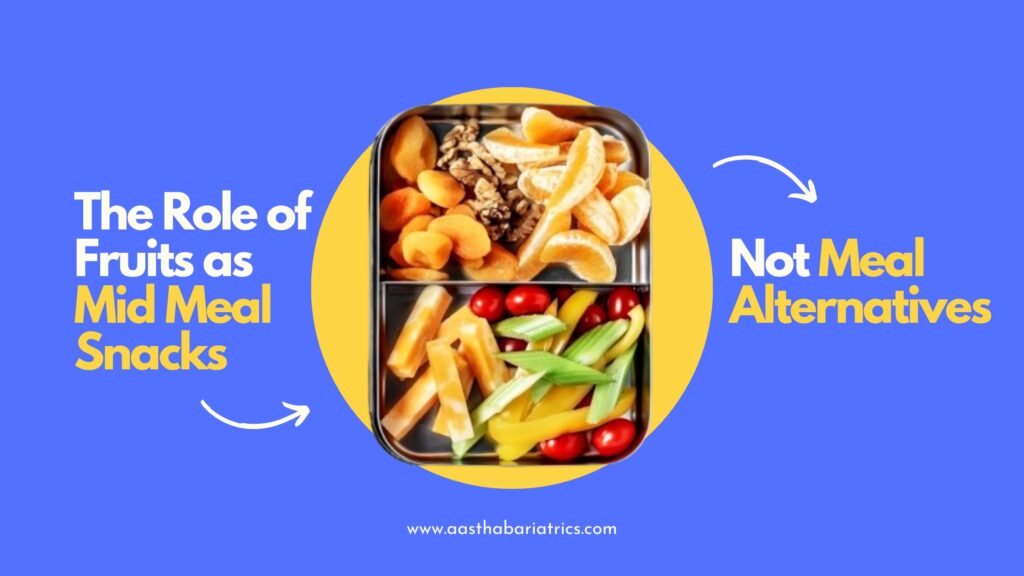
Akansha Mishra
Bariatric Dietician & Content Writer
The Role of Fruits as Mid Meal Snacks, Not Meal Alternatives

In the pursuit of a healthy lifestyle, the role of fruits cannot be overstated. Bursting with vitamins, minerals, and antioxidants, fruits are nutritional powerhouses that undoubtedly deserve a place in our daily diets. However, the question arises: Can fruits serve as a satisfactory alternative to complete meals? Lets now understand the complexity of nutrition and explain why fruits are best consumed as mid meal snacks rather than substitutes for well-rounded meals.
1. Nutrient Balance
Macronutrient Profile – Fruits, while rich in vitamins, fiber, and natural sugars, lack the essential macronutrients needed for a balanced meal. A comprehensive meal typically includes protein, healthy fats, and carbohydrates. Protein, crucial for muscle repair and overall body function, is notably absent in sufficient quantities in most fruits. Healthy fats, necessary for nutrient absorption and satiety, are also limited in fruits.
A meal without these essential macronutrients may leave you feeling hungry shortly after eating and may not sustain your energy levels throughout the day.
Balancing Blood Sugar Levels- The Importance of Fiber –Consuming fruits as midmeal snacks, accompanied by protein or healthy fats, helps modulate the impact on blood sugar levels. The fiber content in fruits slows down the absorption of sugars, providing a steady release of energy. In contrast, relying solely on fruits for a meal might lead to a rapid spike in blood sugar followed by a quick drop, leaving you feeling fatigued and craving more food.
2. Satiety and Caloric Density -
Satiety and Meal Satisfaction – Meals are designed to provide a sense of fullness and satisfaction, which is essential for controlling overall caloric intake. Fruits, being relatively low in caloric density, may not provide the satiety needed to sustain you until the next meal. Including a mix of macronutrients in your meals ensures a more comprehensive and satisfying eating experience.
Caloric Intake and Energy Needs – Relying solely on fruits as meal replacements might inadvertently lead to a lower caloric intake than what your body needs, potentially impacting energy levels, metabolism, and overall well-being. Striking the right balance with a combination of fruits, proteins, fats, and carbohydrates in meals ensures that you meet your daily energy requirements.
3. Micronutrient Variability -
Diverse Micronutrient Needs – While fruits offer an array of essential vitamins and minerals, different fruits contain varying micronutrient profiles. Consuming a diverse range of fruits as mid meal snacks ensures a broad spectrum of nutrients. However, relying solely on one or two types of fruits for an entire meal might result in micronutrient deficiencies, as no single fruit can cover all nutritional needs.
Meeting Daily Requirements – To achieve optimal health, it’s crucial to meet your daily requirements for vitamins and minerals. Incorporating a variety of fruits alongside other food groups in your meals ensures that you’re not only enjoying a spectrum of flavors but also providing your body with the diverse array of nutrients it needs to function optimally.
4. Sustainable Energy -
Steady Energy Release – Meals are designed to sustain your energy levels throughout the day, providing a gradual release of nutrients. While fruits contribute natural sugars for a quick energy boost, they may not provide the sustained energy needed to power you through your daily activities.
Combining for Balance – Combining fruits with other food groups in meals helps achieve a more balanced and sustained release of energy. For instance, adding protein and healthy fats to your midmeal fruit snack can prolong the feeling of fullness and provide a stable source of energy until your next meal.
Practicality and Convenience -
Practical Meal Preparation – Crafting well-balanced meals allows for practical and efficient meal preparation. Including a mix of proteins, fats, and carbohydrates in each meal ensures that your nutritional needs are met without having to meticulously plan separate components. This can be especially valuable for individuals with busy schedules or limited time for meal preparation.
Versatility in Food Choices – The inclusion of a variety of food groups in meals provides versatility in food choices. This not only makes meals more enjoyable but also ensures that you’re exposed to a broad range of flavors, textures, and nutrients. Relying solely on fruits might limit the culinary diversity and nutritional complexity of your diet.
Embracing Nutritional Synergy – While fruits undoubtedly play a pivotal role in a healthy diet, relying on them as complete meal replacements might compromise your nutritional intake. The key lies in embracing nutritional synergy – combining fruits with proteins, healthy fats, and carbohydrates to create well-rounded, satisfying meals. Opting for fruits as midmeal snacks ensures that you enjoy their nutritional benefits while addressing the need for a diverse and balanced diet.
In your journey toward health and wellness, consider the holistic approach of combining fruits with other food groups. By doing so, you not only unlock the full spectrum of nutrients your body craves but also cultivate sustainable eating habits that nourish you from the inside out. Fruits, when enjoyed in harmony with a well-balanced meal, become an integral part of a nutritious and fulfilling culinary experience.






